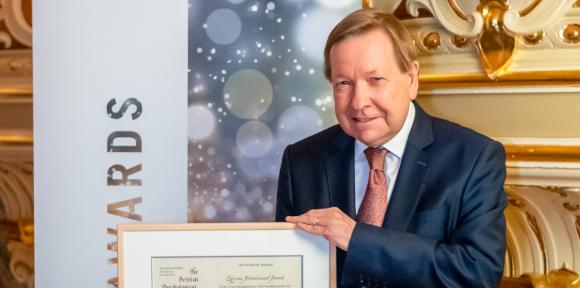
Professor Trevor Robbins has been awarded the 2019 British Psychological Society Lifetime Achievement Award for Distinguished Contributions to Psychological Knowledge.
An internationally renowned cognitive neuroscientist, Trevor Robbins has spent his entire career in the Department of Experimental Psychology, now Department of Psychology, at the University of Cambridge. He read Natural Sciences at Jesus College Cambridge, gaining a first class degree in Psychology (1971) and completed his PhD in the Department of Experimental Psychology under the supervision of Susan Iversen in 1975. He was appointed as a Demonstrator in the Department of Experimental Psychology in 1973 and subsequently promoted to Lecturer and Reader, before becoming Professor of Cognitive Neuroscience in 1997. Robbins was elected to the Chair and Head of Department in 2002 and is only the fourth Head of the Department of Psychology since its establishment as the Psychological Laboratory, later the Department of Experimental Psychology, in 1912. He remained in this role until he stepped down in 2017. He also established, with Professor Ed Bullmore, the MRC-Welcome Trust Behavioural and Clinical Neuroscience Institute from 2002 to 2015.
Robbins’ PhD research was on the behavioural effects of stimulant drugs, linking dopaminergic function to motor control, learning and memory, and his research career has been conceptually oriented to synthesize cognitive and behavioural neuroscience with neuropsychopharmacology. He has had a lifelong interest in the functions of the neuromodulatory monoaminergic (dopamine, noradrenaline and serotonin) and cholinergic neurotransmitter systems in the brain. A special focus has been the functions of the frontal lobes of the brain and their regulation by these neurotransmitter systems across human and animal species. This research is also translational in that it is highly relevant to a variety of neuropsychiatric disorders including obsessive compulsive disorder (OCD), attention deficit hyperactivity disorder (ADHD), drug addiction, depression and schizophrenia, as well as neurological disorders including Parkinson’s and Alzheimer’s diseases.
His distinctive approach to research involves the development and deployment of psychological paradigms to investigate cognitive functions including planning, decision making, learning, attention and self-control, often developed in an innovative way so as to be combined with imaging techniques, including functional magnetic resonance imaging and positron emission tomography. The cross-species approach to his research has enabled not only correlational, but causal analysis of the relationships between brain, behaviour and cognition.
A particularly innovative contribution has been Robbins’ co-invention (with Barbara Sahakian) of the Cambridge Neuropsychological Test Automated Battery (CANTAB) in the 1980s. This enables tests of working memory, planning, attention and other cognitive processes to be conducted on a computer touch-screen in a way that can be adapted for use in humans, monkeys and rats, hence enabling cross-species comparisons of the underlying neural mechanisms as well as ways in which these are altered in psychiatric and neurological disorders.
Robbins has published over 800 research papers with, many in the highest impact scientific journals. He has a Hirsch (h) index of over 180 and is one of the most cited authors in the world across the field of neuroscience. He is the recipient of many honours and awards, including his election as a Fellow of the British Psychological Society (1990), Fellow of the Academy of Medical Sciences (1999) and Fellow of the Royal Society (2005). He was appointed CBE in the New Year’s Honour List in 2012 for services to medical research. Among the many awards reflecting research distinction throughout his career are included the British Psychological Society Spearman Medal (1982); the Foundation IPSEN Neuronal Plasticity Prize (2005); the Distinguished Scientific Contribution award of the American Psychological Association (jointly with his long-term colleague and collaborator Barry Everitt, 2011); the Robert Sommer Award for research into schizophrenia (2016); the Gold Medal of the Society of Biological Psychiatry (2017); and the Patricia Goldman-Rakic Prize for Cognitive Neuroscience (2017). Without doubt, his crowning achievement was to receive 2014 ‘Brain Prize’, the most distinguished prize internationally in neuroscience.
In addition to these exceptional research contributions, Robbins has been devoted throughout his career to promoting and supporting psychology and neuroscience in teaching and research at the University of Cambridge. He oversaw the merger of the Department of Experimental Psychology and the Division Social and Developmental Psychology in Cambridge to form a unified Department of Psychology in the School of the Biological Sciences, serving as its first Head of Department. Arising from this, a new Tripos in Psychology and Behavioural Sciences was established, allowing undergraduates to study psychology in all its richness for the first time during a full three-year degree in Cambridge. He was instrumental in founding ‘Cambridge Neuroscience’ and served as its first Chair.
Robbins has also been actively engaged in supporting the neuroscience field more generally. He chaired the MRC Neuroscience and Mental Health Research Board between 1995 and 1999, and was co-leader of the UK Government 2005 Foresight Project entitled 'Drug Futures 2025?'. He served as President of the European Behavioural Pharmacology Society (1992-1994), the British Association for Psychopharmacology (1996-1998) and the British Neuroscience Association (2009-2011).
